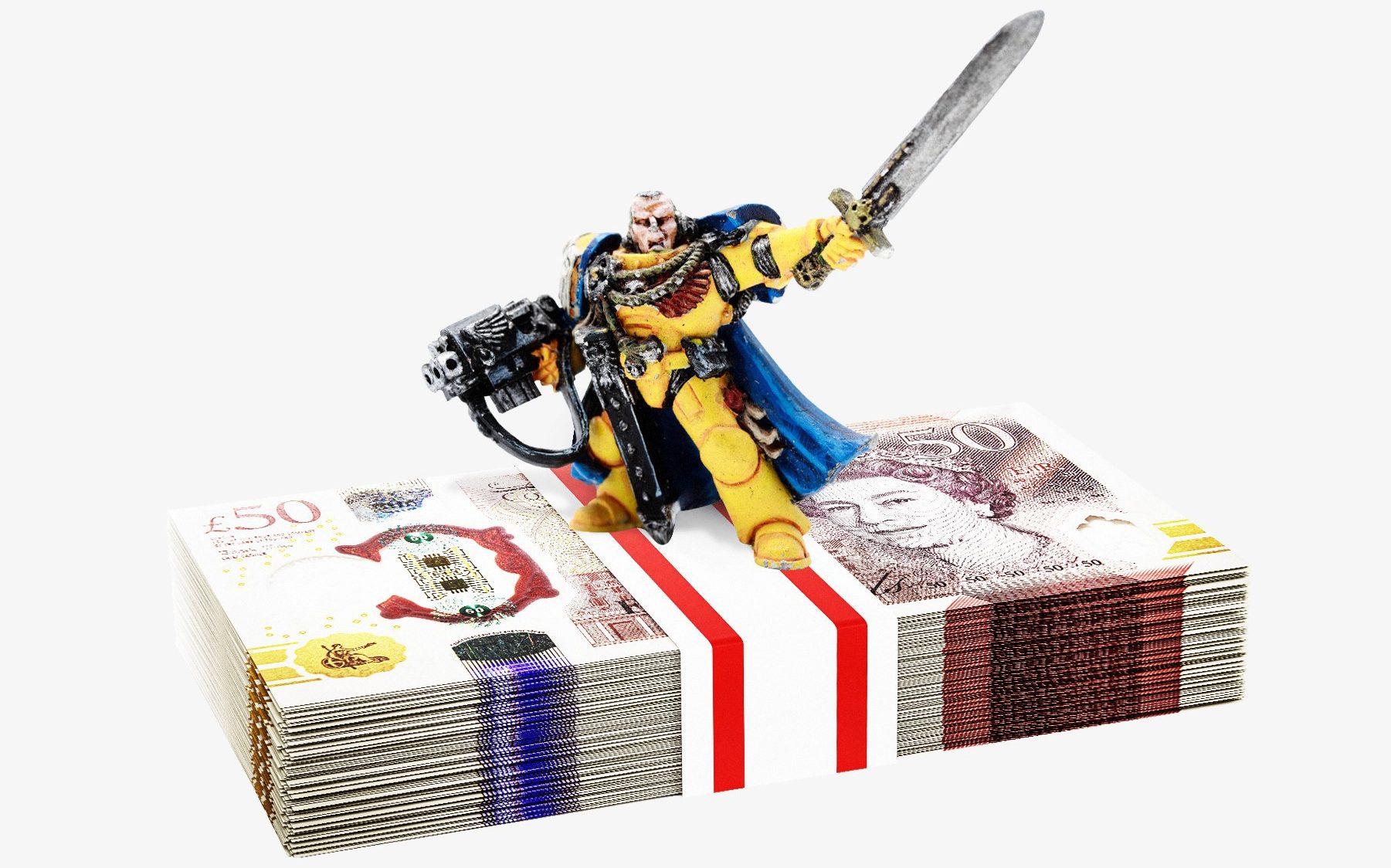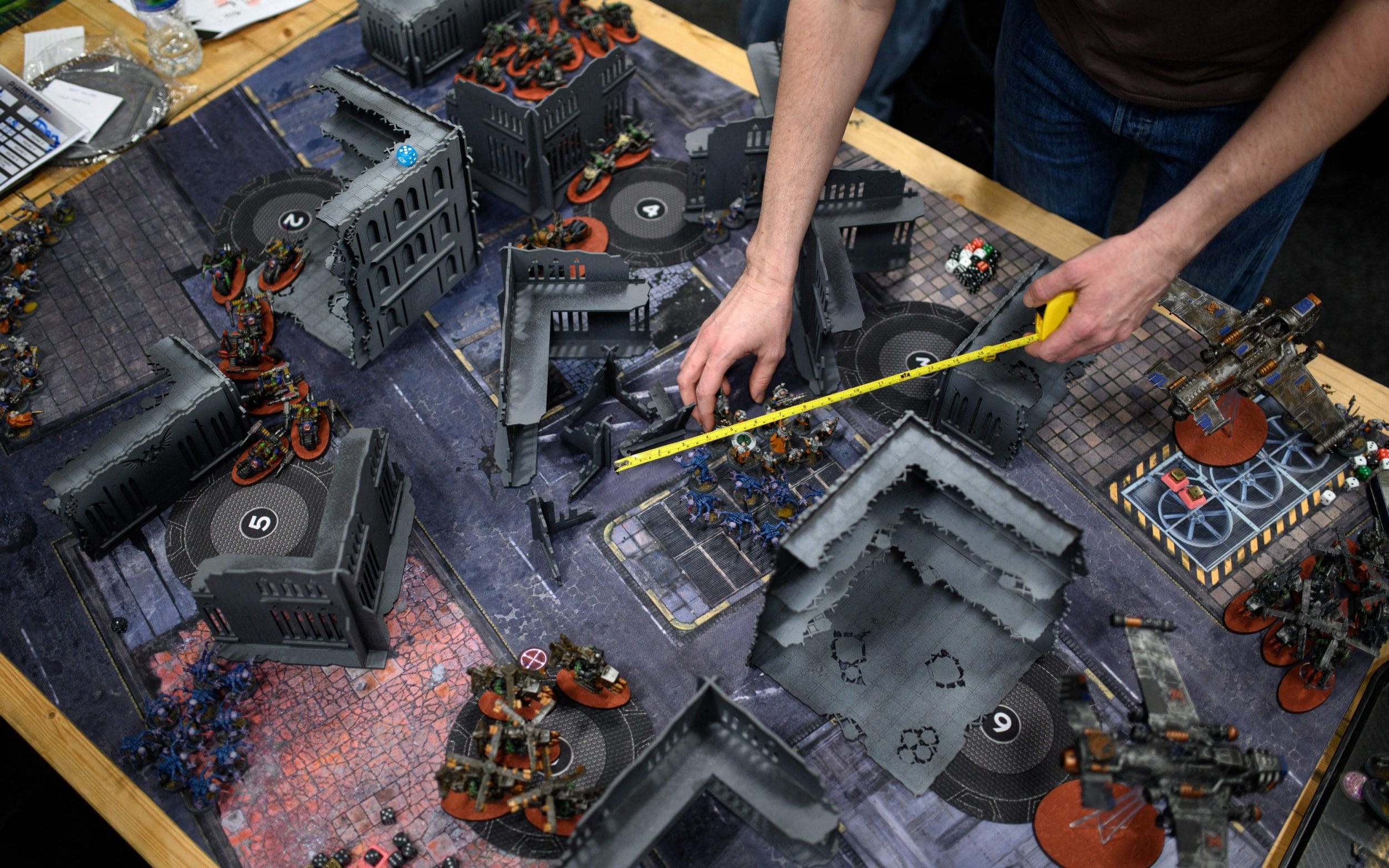
In the grim darkness of the far future, there is only war.
In the present, however, there is a community, born in Nottingham – and it’s willing to part with its cash.
To find it? Follow the canal that runs through the city, turn off into an unremarkable industrial estate and it will reveal itself to you. Look for the bright blue tank (Ultramarine Rhino) under the double-headed eagle (Aquila), the guardians of the group.
, a company which many will never have heard of, but which is so successful it has been catapulted from the bedroom where it was founded into the FTSE 100.
Ascending the stairs, past displays of warfare from 40,000 AD, the Mortal Realms and Middle-earth, you emerge into an enormous shop staffed by the most knowledgeable, passionate and welcoming individuals a retail business could hope to employ – an experience common to all of Games Workshop’s havens.
, where tens of millions died in the far future as the Imperium of Man attempted to rebuff the forces of the Chaos God Nurgle.
All of this is represented through the medium of plastic figurines on a large tabletop.

Using dice and tape measures, you’ll move your armies through wasted battlefields to claim glory for the Emperor, or whoever your allegiance has been pledged to. The tabletop miniature wargame is the best-known of its genre.
But beyond the immense dioramas in the exhibition centre, home to more than 20,000 figures and one piece more than 20 feet long and 20 feet high, beyond the enormous hall laden with gaming tables, beyond the themed bar and restaurant, it is the community that keeps people coming back.
you to be a part of.
, helps to explain the firm’s 11,000pc share price returns. And that’s before we talk about the miniatures at the heart of the business.
These small plastic figures have made shareholders rich. Ten years ago the firm recorded profits of £15m; this year it hit £170m from revenues of more than £500m.
who want to spend it on their once-hidden passions.
A recent video game based on Dungeons & Dragons has sold more than 15 million copies at $60 a piece and is still growing. The video game industry as a whole is set to hit nearly $200bn in annual revenue, far beyond the $30bn of the movie industry this year.
Even on the silver screen, the nerds are outspending their counterparts: the Marvel cinematic universe, based on various comic books, is easily the highest-grossing film franchise of all time, followed by Star Wars.
I spent five hours in Warhammer World and easily could have spent five hours more. Most of that time was spent chatting with the staff while my friend and I sat painting miniatures. While he is a seasoned collector, I’m a lapsed fanatic, more than 15 years out of the hobby. Across the painting bar was a young lad about to head to secondary school and a regular in his 30s.
Throughout the venue were a variety of people of ages and genders, all engrossed and most digging their hands into their pockets – although we were told it was a quiet day, despite watching the tills rack up thousands in minutes. The youngster at our table was allowed to pick out a figurine to help his uncle build his army; the bill was £150.
This is not an unusual spend. While figures start at around £25, an introductory kit will set you back £42.50. The ‘ultimate starter set’ is £130. Some figures cost more than £500. While the game is balanced to allow for smaller costs, the average army a player brings to a table will easily cost more than £200 – and players rarely stop at just one.
any other shopping experience.
The company’s success is unique and rooted in its appreciation of its staff and its customers. As chairman John Brewis said in the company’s most recent annual accounts: “If it was easy everyone would do it.” The report added: “We intend to do this forever. Our decisions are focused on long-term success, not short-term gains.”

This is one of many reasons that Carl Stick, a fund manager at Rathbones, has been a long-standing shareholder in the company. “This is a business aiming to be the best for multiple participants, not just its shareholders, but hundreds of thousands of loyal customers around the world, and its own workforce, who are also regarded as a valuable and loyal resource.
“It generates a lot of cash, which we think it invests wisely back into the business, but also returns to us in the form of a healthy dividend.
“But it is the honest commitment to sustaining a business over many years through the focus on doing one core thing, just very, very well, that sets Games Workshop apart. We believe Games Workshop is unique.”
While the company is one of the most remarkable stories of British business in recent times, and the archetypal recipient of the UK’s nerd dollar, it is not the only company in town chasing the cash.
is the tool to create your own communities. While the pair share a brief history, with the former beginning life as the UK’s distributor of the create-your-own-adventure fantasy game (and rejecting a tie-up from D&D’s co-founder), today they are each behemoths in their own right, offering different ways to scratch the nerd itch.
Unlike Warhammer, all you need to play D&D is willing participants and a couple of books. One can outlay enormous expense on miniatures, hundreds of scenarios and even costumes, but just £20 will buy you the starter set, and your creativity can take you the rest of the way.
Wizards of the Coast, publisher of D&D and card game Magic: The Gathering, was the only profit-generating arm of parent company Hasbro last year. Against a stable that includes Play-Doh, Monopoly, My Little Pony and Transformers, Wizards of the Coast is the clear victor.
While Hasbro’s consumer products and entertainment segments produced combined losses of $2bn, the nerds turned a profit of $526m.
Wizards of the Coast was also briefly the publisher of another valuable brand – Pokémon. The company enjoyed four years with the licence to publish the trading card game of the pocket monsters before it was returned to the joint venture owned by Game Freak, Creatures and Nintendo.
While less of a community-based business, Nintendo holds some of the most valuable intellectual property in the world with Pokémon, Zelda and Mario. While these often stand as the entry point into the world of video games, they rarely lose their lustre and are powerful enough nostalgia for consumers to purchase the latest Nintendo console just for these games – speaking for myself, at least.
Stephen Yiu, of the Peter Hargreaves-backed Blue Whale Growth Fund, has long held the Japanese brand and cites these names – and the firm’s development of them – as one of the many strings to its bow. “The company has been able to update its franchises to stay with the zeitgeist over the past four decades, relentlessly compounding their value through games, movies, theme parks and other initiatives.”
The company still has life in it yet, and the changing culture of Japanese business is also set to drive investor appeal. “Similar to other Japanese companies, Nintendo has a meaningful amount of its market cap in cash. With the changing tide of Japanese corporate governance, this provides valuable optionality for additional capital returns to shareholders or strategic investment.”
Whether or not you’ll ever understand why people spend hours arguing over the intricacies of Owlbears, Squigosaurs or Charizards, you’d be a fool to ignore it.
Play The Telegraph’s brilliant range of Puzzles - and feel brighter every day. Train your brain and boost your mood with PlusWord, the Mini Crossword, the fearsome Killer Sudoku and even the classic Cryptic Crossword.


Post a Comment
0Comments